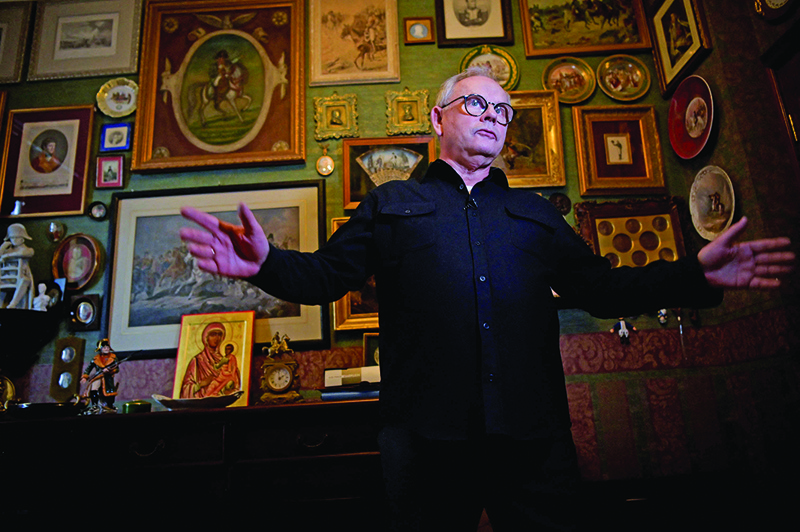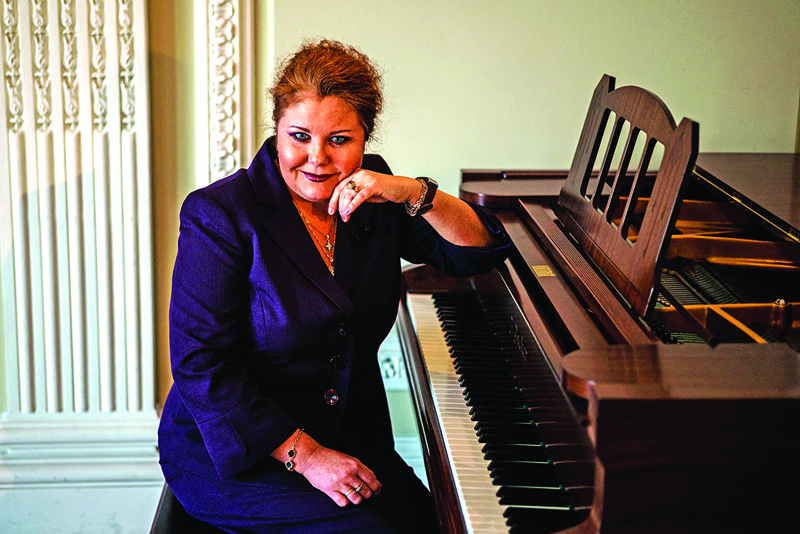 Napoleon memorabilia collector Alexander Vikhrov attends an interview at his apartment in Moscow. – AFP photos
Napoleon memorabilia collector Alexander Vikhrov attends an interview at his apartment in Moscow. – AFP photosIn the early 19th century, the French-speaking Russian nobility admired French emperor Napoleon Bonaparte, seen then as an unparalleled political and military strategist. But when his army invaded Russia in 1812, residents of Moscow preferred to torch their capital and leave it in ruins rather than surrender it to the hated Corsican general. Two hundred years after his death in exile on the remote Atlantic island of St Helena, an anniversary marked tomorrow, Russians' views have since shifted again. "We admire his rise from rags to riches and his death as a martyr," Viktor Bezotnosny, a historian and specialist of the Napoleonic wars told AFP.
During the Soviet period, the Bolsheviks glorified Napoleon as a revolutionary akin to Lenin, and while that image of him changed after the Soviet collapse, his popularity in some circles remained. For Vladimir Presnov, director of a museum on the sweeping fields at Borodino, the site of a decisive battle that saw some 70,000 soldiers perish in a single day, "even the most patriotic Russians no longer see Napoleon primarily as an invader". Meet three Russians who have all formed an intense interest in the French emperor:
 Maria Lyudko, a singing instructor at the Saint Petersburg Conservatory and a descendant of one of Napoleon’s 2,000 soldiers who remained in Russia. — AFP
Maria Lyudko, a singing instructor at the Saint Petersburg Conservatory and a descendant of one of Napoleon’s 2,000 soldiers who remained in Russia. — AFPThe re-enactor
In white uniform, black boots, blue epaulettes and helmet, Mikhail Shmaevich closely resembles a Napoleonic colonel. Playing the role of a rifle corps colonel, he is among a group of history enthusiasts, who reenact French Grand Army battles. "Vive l'Empereur! Vive la France!" the actors on horseback shouted at a re-enactment in February, after the remains of more than 100 Napoleonic soldiers were reburied in eastern Russia.
There are some 2,500 re-enactors in Russia, whose five annual performances attract tens of thousands of spectators to watch battles like Borodino played out. For Shmaevich, who as president of an equestrian club is an excellent rider, Napoleon is a "genius" who was ahead of his time. He says Russia's defeat of Napoleon saw it become a dominant country in Europe and spurred reforms culminating in the end of serfdom in 1861. "It's thanks to him that Russia became a great European power, modernized its industry and its political system," Shmaevich told AFP.
The collector
The walls of Alexander Vikhrov's large apartment in Moscow are lined with paintings depicting Napoleon's military exploits and cabinets filled with miniature busts and memorabilia featuring the French emperor. "Napoleon is the first person in history to become an object of worship even in the countries he invaded," says Vikhrov, the owner of one of the largest private collections dedicated to Napoleon. Since making a small fortune in the economically chaotic years after the collapse of the Soviet Union, Vikhrov has made a hobby of hunting down Napoleon paraphernalia.
Among his prized items is a fragment of the bed in which the Emperor died and a medallion with a lock of Napoleon's hair bought for €4,000 ($4,808). "Who knows, one day this hair could be used to create a Napoleon clone," Vikhrov says, laughing. Napoleon, he says, is a "contradictory character, prone to tyranny towards the end of his reign but above all a great man whom France is trying to put in the shadows."
The descendant
Maria Lyudko, a voice instructor at the Saint Petersburg Conservatory, is proud to be a descendant of one of Napoleon's 2,000 soldiers who remained in Russia after the French army retreated. She says her grandfather stayed in Lida in what is now Belarus, worked as a private tutor and married his student. Lyudko added that she only knows her grandfather's surname: Vigoureux.
At the height of political repression under Soviet leader Joseph Stalin, having a French name was dangerous and her family changed it. But now Lyudko is considering changing it back again. "It is to this Napoleonic soldier that I owe my sense of morale, initiative and responsibility, and also my appreciation of food, humor and resourcefulness," Lyudko said, laughing. The man ultimately in command of the army her grandfather fought in was, a "real hero, intelligent, ambitious, both pragmatic and romantic," she said. "France should be proud of its superhero." - AFP










